This field focuses on researching and providing health care to human populations. While the underlying principles of other areas of science are used in this field, health science concentrates solely on health problems and outcomes. Whether you're interested in medicine, nutrition, or public health, this field can provide a pathway to a career making a difference in the health, and lives, of others.
Health science is a broad field that focuses on health care and health outcomes.
Any individual you see to treat or manage an illness or disease is most likely in the health science field. This includes physicians, dentists, pharmacists, nurses, and optometrists, to name a few. But the field also includes paramedics, genetic counselors, home health aids, athletic trainers, dietitians, speech-language pathologists, and more. Some of these careers or fields require specialized training with or without a college degree.
Many of these careers include an interest in educating the public, whether it involves counseling an individual patient or launching public health campaigns. If you’re interested in the body or health care, there is a career in health science for you.

Education Requirements
Master's degree and board certification
Average Salary
$82k
Genetic counselors help individuals, couples or families understand the risk—for existing family members or during/when considering pregnancy—for genetic conditions which may be apparent at birth or emerge later in life. Their assessment includes interviewing people to gather comprehensive medical history information. Genetic counselors also interpret and share DNA testing results and work with other health care providers to educate patients about inherited conditions.
Skills Needed
In addition to obtaining a bachelor’s degree in a science field like genetics or biology and a master’s degree in genetics or genetic counseling, genetics counselors should be compassionate, non-judgmental and have strong communication skills.
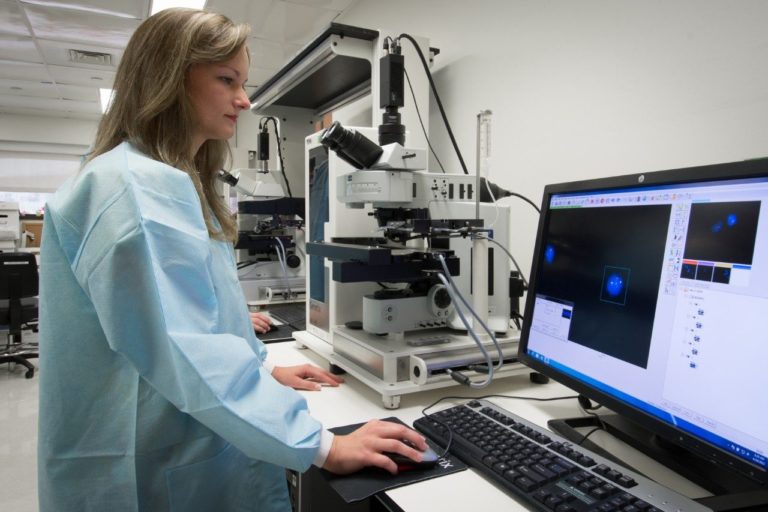
Education Requirements
Bachelor's Degree
Average Salary
$57k
Cytogenetic technologists are scientists, medical laboratory specialists who examine and analyze chromosomes in the genetic material of biological specimens including blood, bone marrow and amniotic fluid. The word “cytogenic” means forming or producing cells. The work of cytogenic technologists, and their study of normal or abnormal genetic material in cells, supports the diagnosis and treatment or study of genetic conditions.
Skills Needed
To become a cytogenetic technologist, you must obtain a bachelor’s degree in cytogenic technology or a related science. Many employers will also require American Society of Clinical Pathologists certification. Cytogenetic technologists should have good problem-solving skills and a high level of concentration in order to be able to accurately and efficiently perform complicated tests.

Education Requirements
M.D. or D.O. and licensure
Average Salary
$208k
Physicians, also called doctors, are medical professionals who diagnose and treat illnesses, injuries, and chronic health conditions. Physicians may practice in a hospital or clinic, or other types of medical facilities; this depends on their specialty (focusing on a disease type or bodily system) and the populations they serve (children, the elderly, women, etc.). Many physicians conduct research or teach medical students or residents in addition to providing care to patients.
Skills Needed
The educational requirements for a physician include obtaining a bachelor’s degree (with pre-med courses in the program) followed by master’s and doctoral degrees. Admission into a M.D. program requires passing the MCAT (Medical College Admission Test). Physicians also take up to seven additional years of postgraduate training (residency and fellowship programs) and must pass a licensing exam. Physicians should be compassionate and willing to advocate for patients, be able to work in a collaborative environment, and be good communicators. They must also have a good memory for large amounts of detailed information.

Education Requirements
Master's Degree
Average Salary
$122k
Physician assistants, commonly known as PAs, are like doctors in that they diagnose and treat illnesses, injuries and chronic health conditions. However, doctors complete four years of medical school followed by internship and residency, whereas PAs generally complete their training in two years. Physician assistants usually work with doctors, surgeons and other healthcare workers in a team setting and practice in a variety of health care facilities.
Skills Needed
Physician assistants must earn bachelor’s and master’s degrees to enter the field, along with meeting state licensure requirements and passing score a national certifying exam. Physician assistants should have strong communication skills, compassion and empathy, and good problem-solving ability.
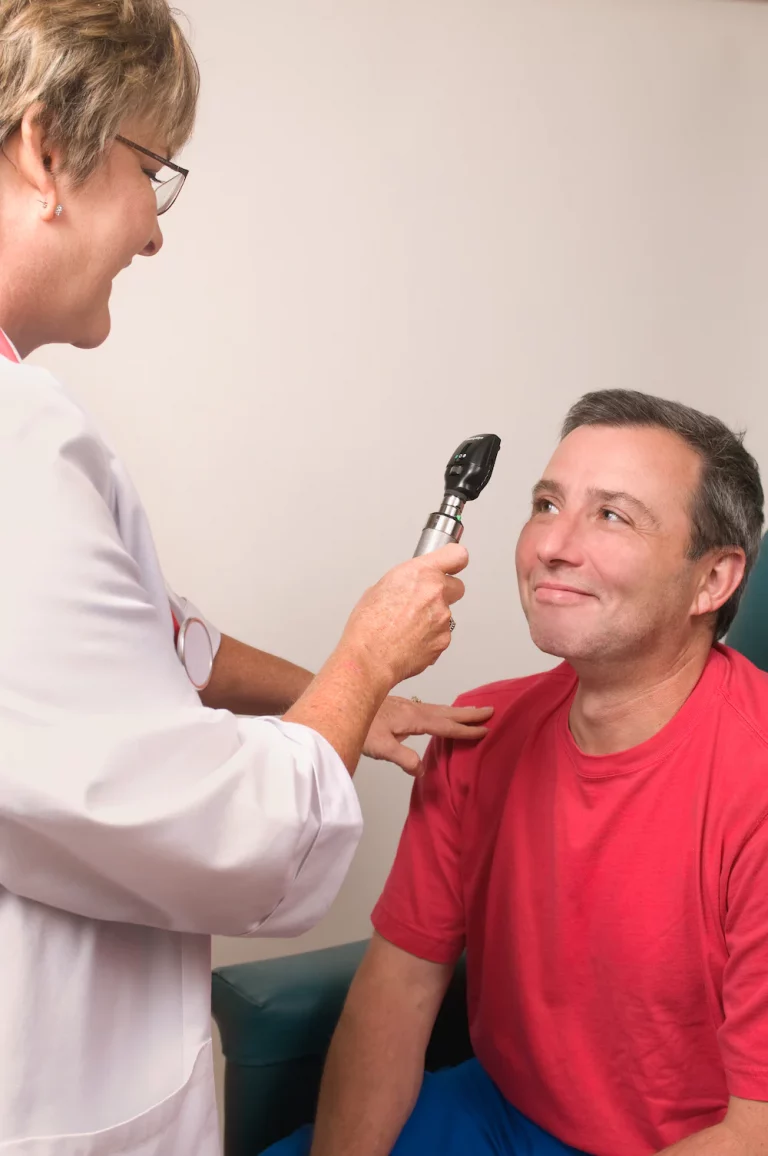
Education Requirements
Doctoral
Average Salary
$124K
Optometrists provide primary vision care. Many people call them “eye doctors,” and although they aren’t medical doctors (M.D.); they are O.D.s and licensed to practice optometry, which includes conducting eye exams and subsequently prescribing and fitting patients for glasses and contact lenses. Optometrists also diagnose and treat certain eye conditions. Although the terms optometrist, ophthalmologist and optician look and sound similar, these practitioners have different levels of training and differ in what they can diagnose and treat.
Skills Needed
Aspiring optometrists must earn a bachelor’s degree and fulfill standardized testing requirements (Optometry Admissions Test/OAT) before applying for four-year optometry programs, which are highly competitive in the U.S. Clinical experience and meeting licensure requirements are also needed before entering the field. Optometrists should have good communication and interpersonal skills as well as attention to detail and high concentration for precision work.

Education Requirements
Medical Degree and 4 years of residency
Average Salary
$118K
Anesthesiologists are physicians who administer general or regional anesthesia, usually during surgeries or diagnostic procedures that would cause a patient considerable pain or discomfort without it. Anesthesiologists monitor a patient’s vital signs before, during and after procedures. They also assess a patient’s medical history and condition to determine appropriate sedation and identify risks that are shared with the medical team as procedures are planned.
Skills Needed
Anesthesiologists complete a bachelor’s degree followed by a four-year medical degree, then four years of residency. The next steps are passing a national board exam, completing a fellowship program or time in private practice, and meeting requirements for certification and licensing. Anesthesiologists should be detail-oriented, work well under pressure and be good problem-solvers. They should also be compassionate and have good interpersonal skills.

Education Requirements
Doctoral
Average Salary
$208k
Surgeons are doctors with specialized training to perform surgeries, also called operations. Surgery essentially involves repairing, modifying or removing tissue that is diseased or damaged. Techniques may be invasive, minimally invasive, or non-invasive using instruments from traditional scalpels to lasers and robotic systems. Some surgeons perform a wide variety of procedures, but there are many surgical specialties that focus on specific body systems or patient populations.
Skills Needed
SKILLS NEEDED: Surgeons typically need a bachelor’s degree, a four-year medical degree, and up to seven years in internship and residency programs. Surgeons should have excellent manual dexterity as well as the stamina and patience for long hours of highly detailed work. They should also be good multitaskers and problem-solvers with the ability to remain calm under pressure.
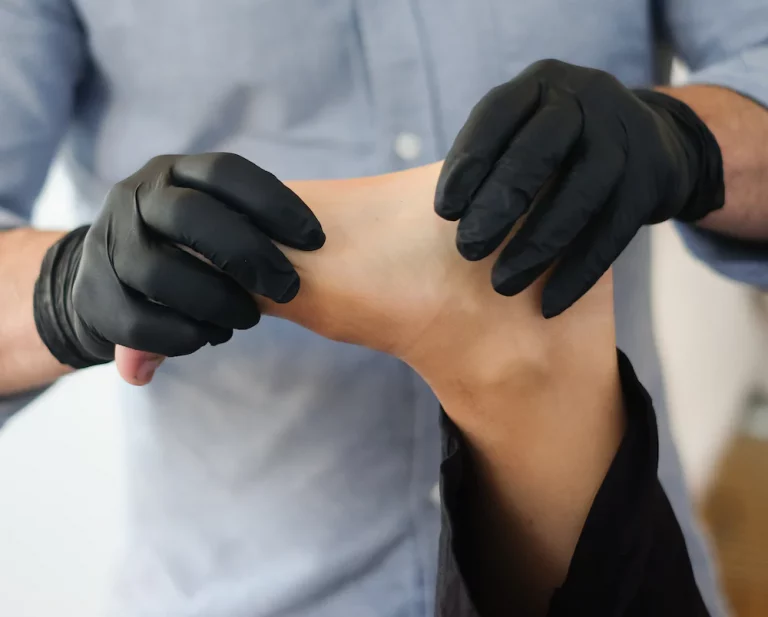
Education Requirements
M.D.
Average Salary
$146k
Podiatrists are physicians who treat problems with the feet and toes as well as the lower legs. Their patients may have injuries, like fractures and sprains; conditions like bunions and hammertoes that cause pain or affect standing and walking; or any condition from arthritis to diabetes that affects the bones, nerves, muscles, skin or blood vessels of the feet and legs. Podiatrists also treat nail disorders like fungal infections and ingrown toenails.
Skills Needed
Aspiring podiatrists should expect to complete a bachelor’s degree followed by four years of podiatric medical school plus a minimum of two years of residency training. They will also have to pass national board exams and meet state licensure requirements. Like other medical professionals, podiatrists should be compassionate and have good communication and critical thinking skills.
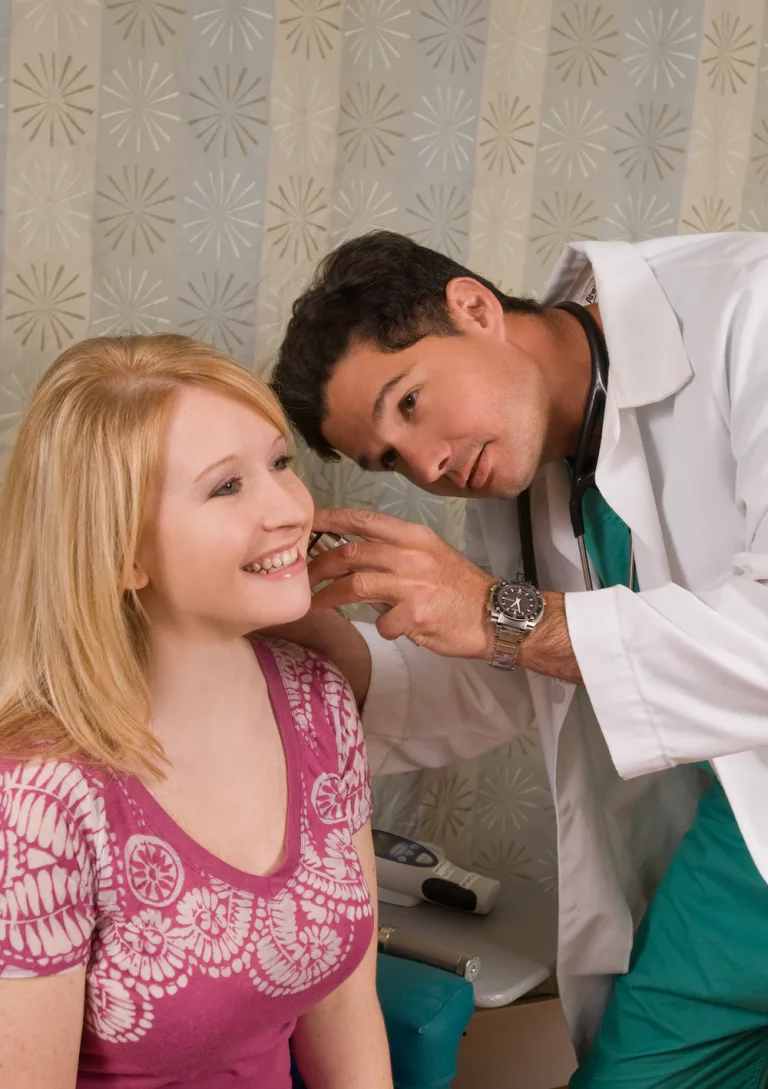
Education Requirements
Medical School
Average Salary
$202k
An ENT is an ear, nose and throat specialist (the term otolaryngologist is less commonly used). These physicians are generally trained in both medicine and surgery to treat a wide variety of disorders that affect hearing, swallowing and speech, breathing and sleep, the tissues of the head and neck, sinuses, and more. According to the American Academy of Otolaryngology, ENT is the oldest medical specialty in the U.S.
Skills Needed
ENTs must earn an undergraduate degree followed by four years of medical school and up to 7 years in residency and fellowship programs. ENTs should be detail-oriented and have both good hand-eye coordination and manual dexterity. Good communication skills and compassion are also important qualities.
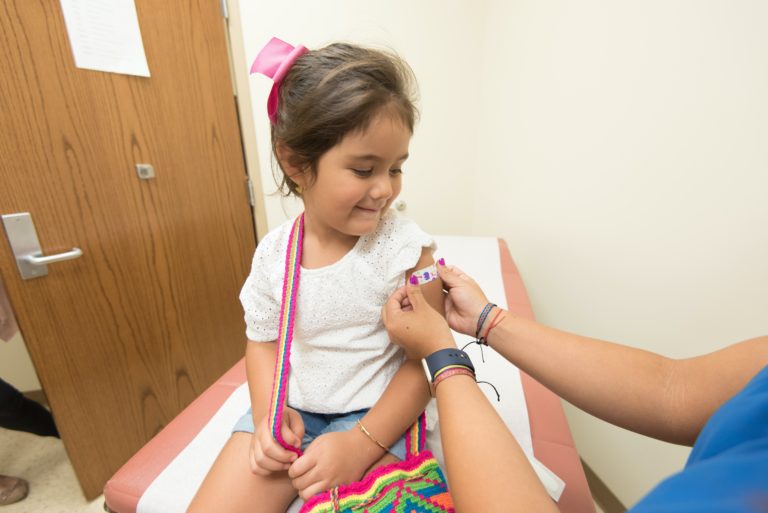
Education Requirements
Postsecondary nondegree program and certification
Average Salary
$35k
Phlebotomists are medical professionals trained to draw blood for testing or donation through venipuncture (inserting a hollow needle into a vein), finger pricks or heel pricks in infants. Phlebotomists can also perform blood transfusions. They do not, however, start IVs or give injections. Phlebotomists work in hospitals and clinical facilities, medical and diagnostic laboratories, and even mobile facilities; some travel to care centers or to provide in-home care.
Skills Needed
Phlebotomists are required to complete an accredited training program (typically two years) and in some states or for some employers must also meet licensing or certification requirements. In addition to having a steady hand, good hand-eye coordination and attention to detail, phlebotomists should exhibit empathy and good interpersonal skills.

Education Requirements
Doctorate degree
Average Salary
$91K
Physical therapists work with patients who are injured or ill to help them improve their movement or function, or to manage pain and discomfort. They use hands-on techniques, perform therapies using tools like ice/heat or ultrasound, guide patients through exercise, and provide education as an important component of a rehabilitation or treatment plan. Physical therapists work in settings ranging from clinics, hospitals and care centers to workplaces, sports facilities and patients’ homes.
Skills Needed
To become a physical therapist, you’ll need to earn a bachelor’s degree followed by a three-year doctorate program in physical therapy, as well as pass a state licensure exam. A physical therapy needs to have compassion and good communication skills but also the strength and stamina needed for physically demanding work that may include long periods of standing, crouching and bending.

Education Requirements
Associates Degree
Average Salary
$49k
Physical therapist assistants (PTAs) work under the supervision of physical therapists to help ill or injured patients improve movement or function, or to manage pain and discomfort. They assist physical therapists in some important administrative responsibilities like interviewing patients to assess health history or providing information to families on post-treatment care, but PTAs also observe patients throughout therapy and administer some aspects of treatment such as helping patients perform exercise repetitions.
Skills Needed
PTAs must graduate from an accredited PTA education program—usually earning an associate degree in less than two years—and pass a state exam. PTAs should have good communication skills and empathy for the patient along with the ability to execute the details of a physical therapy plan either independently or alongside a physical therapist.
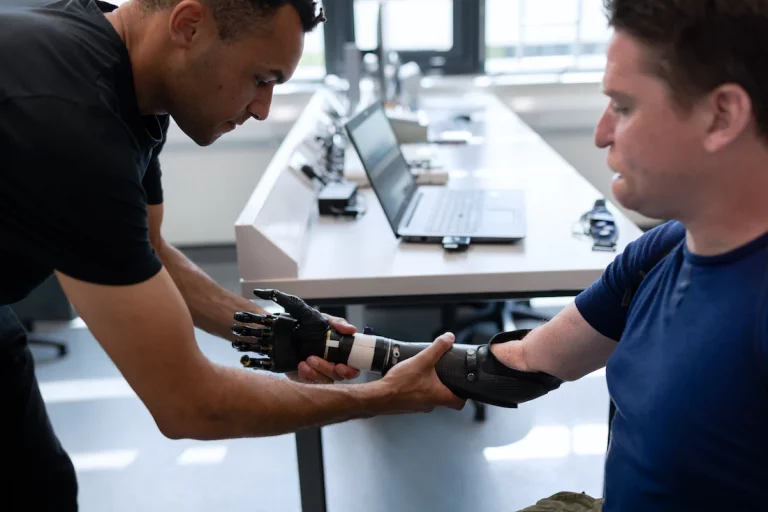
Education Requirements
Master's Degree
Average Salary
$86k
Occupational therapists (OTs) help people with illness or injuries improve or recover with the targeted objective of being able to perform skills needed for everyday activities. OTs also help people with physical disabilities or cognitive or communications impairment improve their quality of life by helping them gain or strengthen skills that allow them greater independence, from self-care tasks to using adaptive equipment or mobility support.
Skills Needed
OTs must earn bachelor’s and master’s degrees, and admission to occupational therapy degree programs is quite competitive in the U.S. Occupational therapists should be compassionate, patient, resourceful and optimistic and also have good interpersonal and communication skills.

Education Requirements
Associate's degree
Average Salary
$62k
Occupational therapy assistants (OTAs) work under the supervision of occupational therapists to help patients recover or gain skills needed for everyday activities and greater independence. They help patients who are ill or injured as well as individuals living with physical or developmental disabilities. OTAs typically participate in providing therapy and encourage patients to complete their exercises and tasks, and they may also execute support activities such as taking patient histories and providing progress updates to families.
Skills Needed
OTAs must earn an associate degree from an accredited program, which typically takes two years, and also pass the National Board of Certification in Occupational Therapy (NBCOT) exam and meet state licensure requirements. Like OTs, OTAs should be compassionate, patient, resourceful and optimistic, and be able to execute instructions and communicate effectively.

Education Requirements
Doctoral
Average Salary
$129k
Essentially, pharmacists dispense drugs to patients as prescribed by physicians and other qualified health care professionals. They also advise patients and medical professionals about the medications and their safe use. Pharmacists may also calculate, measure and mix ingredients. They may also have operational responsibilities such as hiring and managing staff, record-keeping or purchasing supplies. Some pharmacists provide support services such as administering vaccinations or advising patients on managing medical conditions or using monitoring devices.
Skills Needed
After completing a bachelor’s program, pharmacists are required to complete a doctor of pharmacy degree program, usually a four-year program. They must pass multiple exams to become licensed. Pharmacists should possess good analytical and critical thinking skills along with good math ability and attention to detail. Pharmacists should also have strong communication skills.

Education Requirements
High School Diploma
Average Salary
$37k
Pharmacy technicians organize and prepare medications under the supervision of a pharmacist. They read prescriptions, prepare medication labels, and assemble supplies and packaging. They calculate, measure and mix ingredients. Pharmacy techs also maintain pharmacy and patient records. They not only interact with medical professionals, but also may provide direct customer service to patients and caregivers, especially in a retail pharmacy setting.
Skills Needed
Some employers require only a high school diploma or GED for pharmacy techs, but an increasing number are requiring postsecondary education or training through a certificate, diploma or associate degree program. Pharmacy techs should have good mathematical proficiency, be organized and detail-oriented, and have good communication and problem-solving skills.

Education Requirements
Bachelor's Degree
Average Salary
$77k
Pharmaceutical sales representatives work for pharmaceutical manufacturers and distributors. They inform and educate health care providers about their products’ targeted beneficial use, but also potential side effects and drug interactions. Pharma sales reps become experts on their product lines and must also be knowledgeable about marketplace competitors’ options in order to be able to clarify the differences between products and emphasize the advantages their product will provide for patients.
Skills Needed
Aspiring pharmaceutical sales reps should expect companies to require them to have obtained a bachelor’s degree or higher. They should have a high degree of confidence, the ability to learn a great deal of detailed information on the products they represent (as well as the competitions’), and have strong closing ability and interpersonal skills.
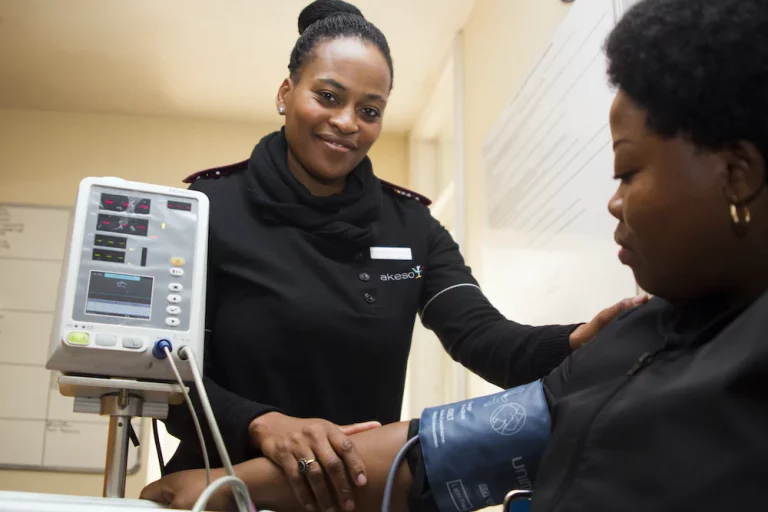
Education Requirements
Bachelor's Degree
Average Salary
$77k
Pharmaceutical sales representatives work for pharmaceutical manufacturers and distributors. They inform and educate health care providers about their products’ targeted beneficial use, but also potential side effects and drug interactions. Pharma sales reps become experts on their product lines and must also be knowledgeable about marketplace competitors’ options in order to be able to clarify the differences between products and emphasize the advantages their product will provide for patients.
Skills Needed
Aspiring pharmaceutical sales reps should expect companies to require them to have obtained a bachelor’s degree or higher. They should have a high degree of confidence, the ability to learn a great deal of detailed information on the products they represent (as well as the competitions’), and have strong closing ability and interpersonal skills.

Education Requirements
High School Diploma or Equivalent
Average Salary
$48k
Practical nurses provide basic nursing and medical care to patients, which can vary greatly depending on the facility and encompass everything from taking vital signs and updating patient charts to changing wound dressings and preparing patients for surgery. Practical nurses have a lesser degree of responsibility than RNs; they usually don’t give medication or perform diagnostic testing. Many nurses gain experience as a practical nurse while pursing more advanced credentials.
Skills Needed
Practical nurses graduate from an accredited program that typically includes approximately one year of coursework plus practical application at a medical facility. Physical strength and stamina are advantageous for everyday tasks like helping a patient move from one bed to another or walk to the bathroom. Practical nurses should be detail-oriented, observant and compassionate.

Education Requirements
Master's Degree
Average Salary
$100k
Advanced practice nurses (APRNs) may include nurse practitioners, clinical nurse specialists, nurse anesthetists and nurse midwives who may serve as primary care providers. They treat and diagnose medical conditions and advise patients on ongoing care.
Skills Needed
APRNs must have not only a bachelor’s degree, but in addition to RN education and licensing will also obtain a master’s degree or higher and training in their specialty. APRNs should be compassionate and have a high degree of attention to detail. Stamina and strength are also useful for a position that may require long periods of standing or walking in addition to direct patient assistance for everyday tasks.

Education Requirements
Completion of State-Approved Program
Average Salary
$30k
Certified nursing assistants (CNAs) assist other medical personnel under their supervision. Many aspiring medical professionals enter the field as CNAs to gain valuable patient-care experience while pursing more advanced credentials. CNAs’ daily responsibilities vary widely from answering call buttons to helping patients transfer to and from wheelchairs to assisting patients with bathing, dressing and toileting.
Skills Needed
CNA training can be completed in as little as four to 10 weeks. CNAs should be good communicators, have patience and compassion, and have the strength and stamina necessary to execute physically demanding or intimate-care tasks.
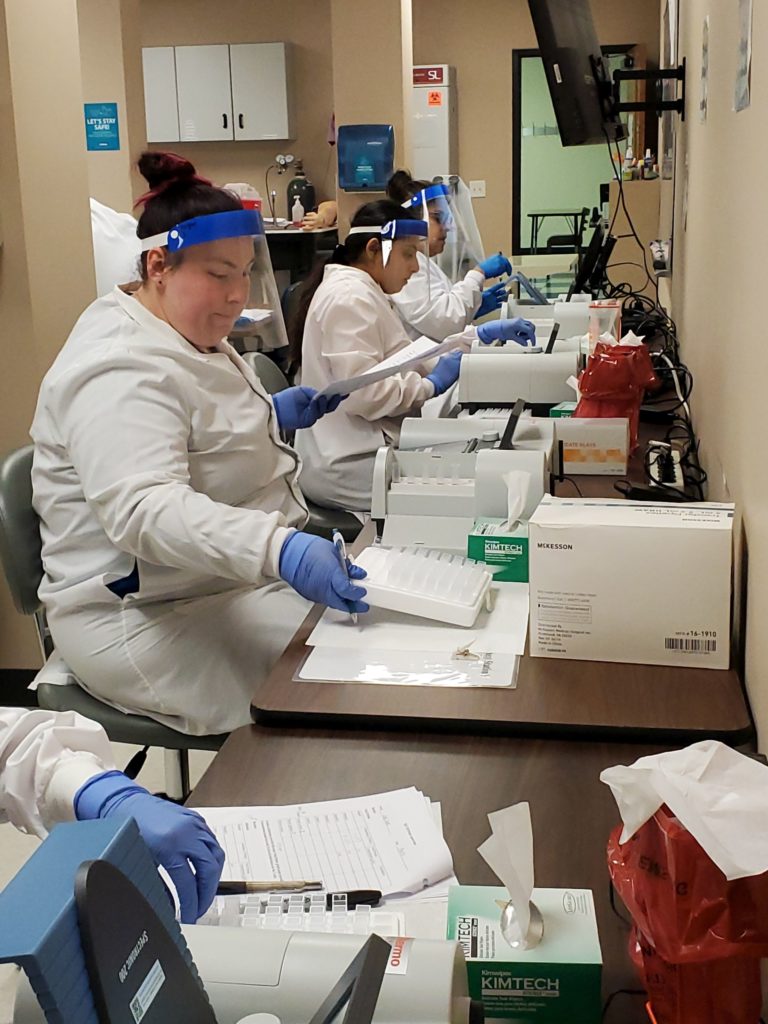
Education Requirements
High School Diploma or equivalent
Average Salary
$30k
Medical laboratory assistants take tissue samples, blood and other bodily fluids from patients and prepare the specimens for examination by a physician or medical laboratory technologist. They are typically also responsible for some lab and equipment maintenance.
Skills Needed
Medical lab assistants have at least two years of post-secondary education and board certification through the American Society for Clinical Pathology or American Medical Technologists. Medical laboratory assistants should be organized and have strong attention to detail.
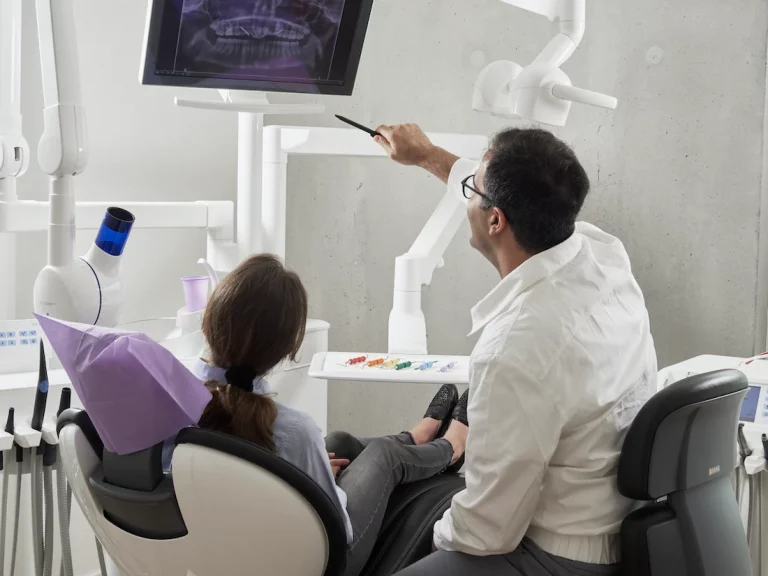
Education Requirements
Doctoral
Average Salary
$163k
Dentists diagnose and treat teeth, gums and oral tissues. Most dentists are listed with DDS after their name, but some may be listed as DMD; Doctor of Dental Surgery, Doctor of Medicine in Dentistry or Doctor of Dental Medicine all mean graduation from an accredited dental school. Dentists provide regular examinations and advise patients on oral care, and also perform procedures including filling cavities, extracting teeth, and repairing damaged teeth.
Skills Needed
Dentists must have a bachelor’s degree followed by four years of dental school and possible residency training for specialties such as oral and maxillofacial surgery, periodontics, or pediatric dentistry. Dentists must also pass board examinations and meet state licensing requirements. Dentists should be comfortable with close interaction and have good communication skills, be compassionate, and have good dexterity and coordination for precise work.
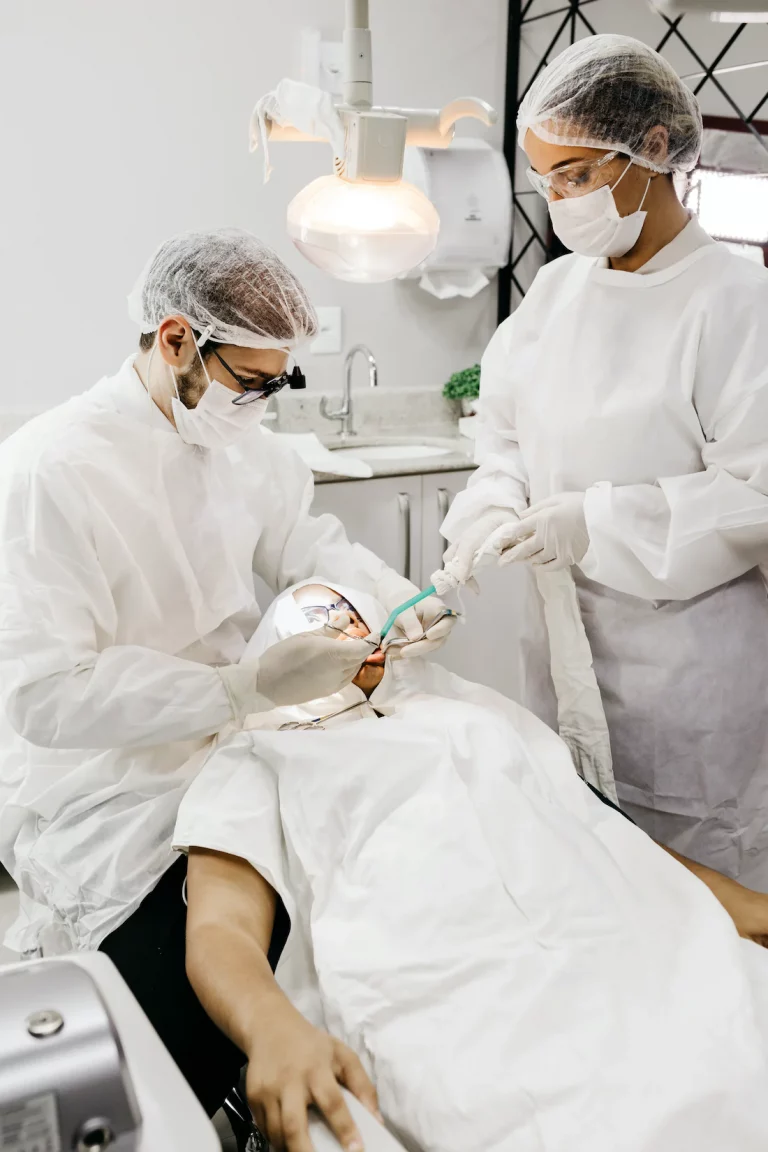
Education Requirements
Associate Degree
Average Salary
$78k
Dental hygienists administer routine teeth cleanings, fluoride treatments and X-rays, and also apply sealants. During these procedures, hygienists also assess and report on patients’ oral health. They may also advise patients on good oral health habits and assist with administrative responsibilities like updating patient files and preparing and maintaining equipment and supplies.
Skills Needed
Dental hygienists will usually have an associate degree in dental hygiene. Dental hygienists should have compassion for patients who may be experiencing pain, discomfort or anxiety at the dental appointment. They should also be comfortable with close interaction and have the dexterity and stamina for close work and long periods of standing.
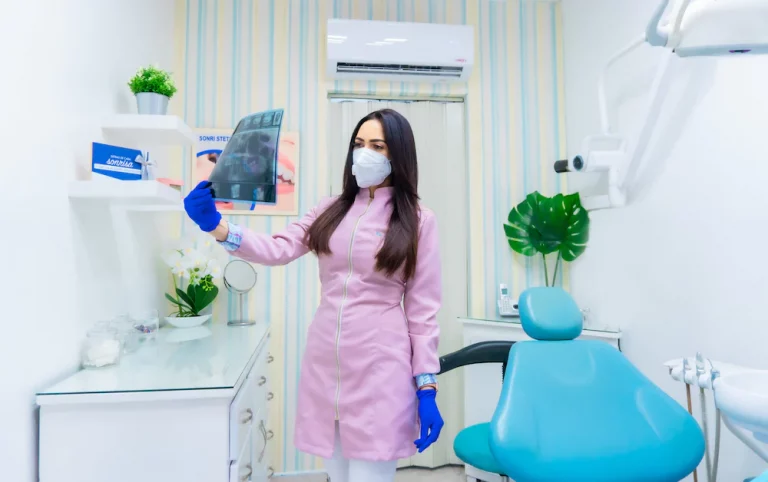
Education Requirements
Dental Degree
Average Salary
$288k
Orthodontists are dentists with special training to implement procedures to straighten teeth and correct the alignment of teeth and jaws; they typically evaluate patients’ progress through regular visits over months or years. They also teach their patients how to care for their braces, retainers, bands, spacers, aligners or other dental devices.
Skills Needed
Orthodontists must have a bachelor’s degree followed by four years of dental school and specialty training for orthodontics, then pass board examinations and meet state licensing requirements. Orthodontists should be comfortable with close interaction and have good interpersonal skills with patients of all ages, have a compassionate nature for patients who are undergoing what can be uncomfortable procedures, and have good dexterity and coordination for precise work.
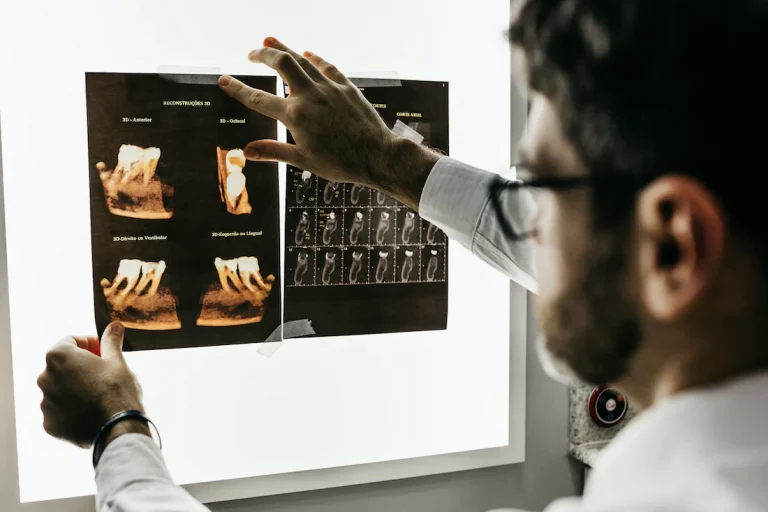
Education Requirements
Dental Degree
Average Salary
$258k
Periodontists are dentists who specialize in treating periodontal disease, often called gum disease, through surgical or nonsurgical methods. Some general dentists will treat simple periodontal disease but refer patients to a periodontist if the disease is more severe or advanced. Periodontists also place dental implants and provide services to treat infected root surfaces or remove damaged root tissue.
Skills Needed
Periodontists must graduate from a four-year dental school after earning a bachelor’s degree. They also receive several years of specialized training in periodontics. Periodontists should have good communication skills, a reassuring demeanor, and the stamina for a job that requires much standing, detailed work, and a steady hand.
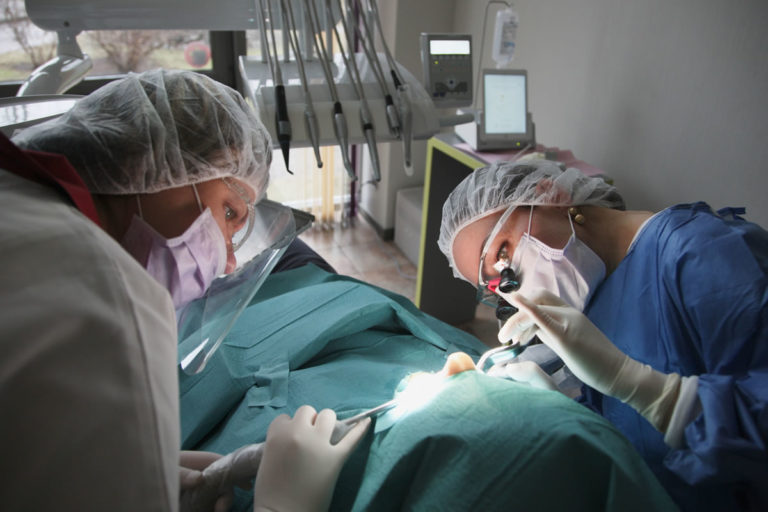
Education Requirements
Masters in Dental
Average Salary
$283,000
Oral and maxillofacial surgeons specialize in dentistry that surgically addresses disease, malformation or injuries to bone and tissues of the mouth, jaw or lower face (maxillofacial area). They treat conditions from impacted wisdom teeth and misaligned jaws to oral cancers and broken teeth. Oral and maxillofacial surgeons are also trained in anesthesia and pain control.
Skills Needed
Oral and maxillofacial surgeons attend four years of dental school after earning a bachelor’s degree, followed by four to six years of residency training. They must also apply for state licensure. These dental specialists should have physical dexterity and stamina for long periods of standing and precise work, and compassion for their patients.

Education Requirements
Master's Degree
Average Salary
$49k
Mental health counselors assess and provide therapy to patients experiencing emotional or psychological distress, or who are seeking guidance in managing relationships and life situations. They may advocate for additional services for patients in crisis situations. Counselors work with individuals, couples, families or groups. They cannot prescribe medications but can make references to other practitioners with that authority.
Skills Needed
Mental health counselors must complete a bachelor’s degree followed by a master’s degree program and clinical work that usually takes three to five years. They must also pass a board examination and apply for licensure. Counselors should have excellent interpersonal and communication skills, be skilled at critical thinking and problem-solving, and be nonjudgmental of troubled clients.

Education Requirements
Medical Degree
Average Salary
$226k
Psychiatrists are doctors who specialize in both psychological and physical aspects of mental health. They may also treat substance abuse. They create treatment plans that may include psychotherapy, behavioral therapy, prescription medications and medical management.
Skills Needed
Aspiring psychiatrists must earn a bachelor’s degree and complete a four-year medical school program plus four years of residency and possible fellowship training. Psychiatrists must also be board-certified and hold a medical license in their state. Psychiatrists should have excellent interpersonal and communication skills, be skilled at critical thinking and problem-solving, and be nonjudgmental of troubled clients.

Education Requirements
Bachelor's Degree
Average Salary
$83k
Mental health case managers work with clients who have mental illness, substance abuse problems, or other challenges access resources in the community to help them meet their recovery and wellness goals. They assist patients in improving quality of life and gaining a higher degree of independence and self-sufficiency.
Skills Needed
Mental health case managers must have a bachelor's degree at minimum, and many employers require a master's degree. Case managers should be organized and be able to access resource information quickly and easily. They should also be compassionate, have excellent interpersonal skills, be flexible and be skilled at finding unique solutions for highly individualized client situations.

Education Requirements
Bachelor's Degree
Average Salary
$115k
Psychiatric technicians provide direct care for people who have mental illness or developmental disabilities. Psych techs are usually responsible for monitoring patients’ conditions and helping patients manage daily activities in hospitals, residential facilities, and similar healthcare settings.
Skills Needed
Psychiatric technicians are required by most employers to have a high school diploma or GED and a postsecondary certificate, although some provide on-the-job training. Five states require licensure. Psychiatric technicians should be compassionate, patient and caring, and have good interpersonal skills. They should also have the stamina to work long hours on their feet and in sometimes stressful circumstances.

Education Requirements
Master's Degree
Average Salary
$31k
Community health and human services practitioners work in a variety of community-based settings and with a broad range of clientele from children to the elderly, and from adults who need assistance with daily tasks to people in crisis.
Skills Needed
Community health and human services practitioners are generally required to have an associate or higher degree. They should have compassion and understanding for clients in challenging situations and be resourceful and flexible.
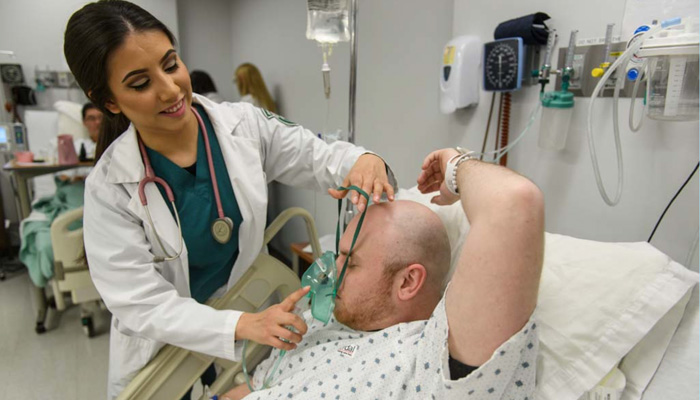
Education Requirements
Associate Degree
Average Salary
$62k
Registered respiratory therapists (RRTs) examine, diagnose and treat individuals experiencing lung disease or breathing disorders. They manage assistive equipment such as ventilators, assess lung function, administer medication and administer oxygen.
Skills Needed
RRTs typically must have an associate degree to qualify for licensure, which is required in 49 states. They should be compassionate, with good interpersonal skills. RRTs should also be organized and have good attention to detail. They should also be able to maintain composure in emergency situations.
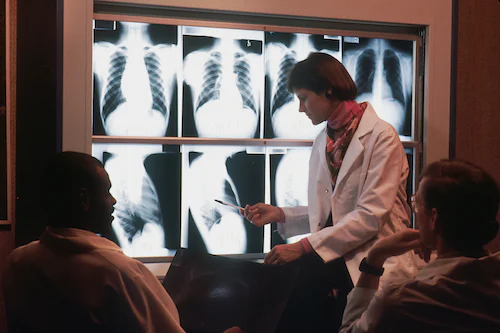
Education Requirements
Medical School
Average Salary
$410k
Radiologists are doctors who use medical imaging such as X-rays, CT (computed tomography) scanning, MRI (magnetic resonance imaging), PET (positron emission tomography) and ultrasound to diagnose and treat medical conditions and injuries. Radiologists examine and interpret medical images and sometimes also operate the special equipment used to obtain them.
Skills Needed
Radiologists must complete a bachelor’s program followed by four years of medical school and a four-year residency, plus a one- or two-year fellowship in a radiology specialty. Radiologists should be compassionate, good communicators and extremely detail-oriented for precise examination of images.
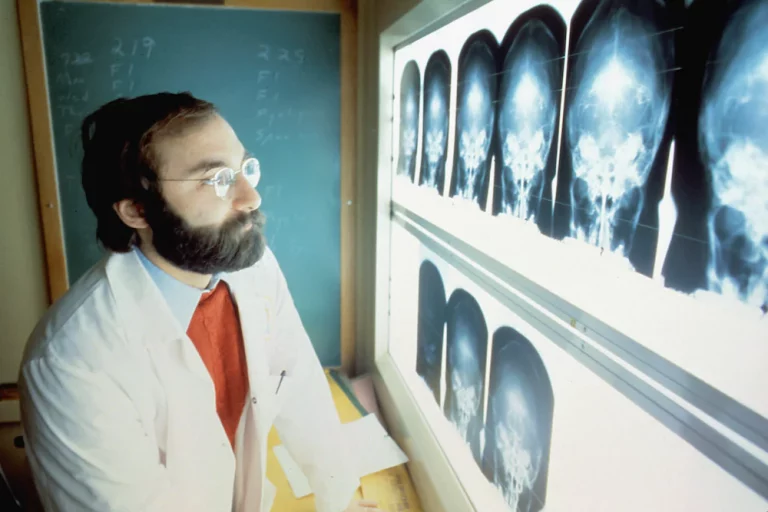
Education Requirements
Associate's Degree
Average Salary
$62k
Radiologic technologists (also called radiographers) specialize in performing X-ray and/or CT (computed tomography) scanning and sometimes MRI (magnetic resonance imaging) scanning. The images are then interpreted by a radiologist or doctor as part of diagnosis and management of an injury or medical condition. Radiologic technologists may work in hospitals, diagnostic facilities, medical clinics or care centers.
Skills Needed
Radiologic technologists must have a high-school diploma or GED plus an associate degree or a bachelor’s degree; most have an associate degree that takes about two years to complete, while a bachelor’s degree program will take two more years. Radiologic technologists must meet the requirements for state licensure and subsequent continuing education requirements. Radiologic technologists should have good interpersonal skills and be flexible in managing what can be an unpredictable workflow. They should also be observant and detail-oriented.
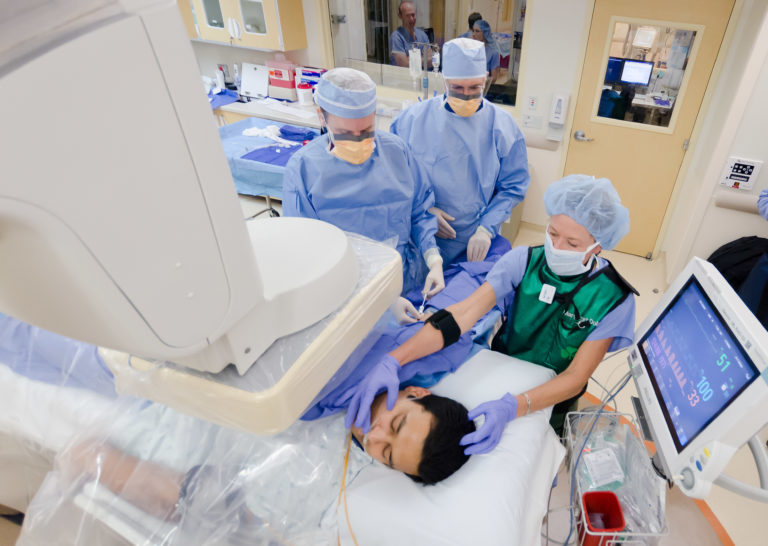
Education Requirements
Associate's Degree
Average Salary
$97k
Radiology nurses provide care for patients during various imaging procedures or radiation therapy, and they also administer contrast agents. They help ensure medical imaging quality, monitor patients, and often coordinate care between radiology and other departments in a hospital or clinical setting.
Skills Needed
Radiology nurses must earn an associate degree in nursing and pass certification requirements to practice; many have a bachelor’s degree. They must also have specialized training in radiology. Radiology nurses should be observant and good problem-solvers as well as have the ability to make decisions under pressure. They should also have good interpersonal skills.

Education Requirements
Associate's Degree
Average Salary
$64k
Medical imaging and medical 3D printing specialists are technologists with special training in applying cutting-edge technology in medical settings, such as creating detailed three-dimensional representations from imaging procedures.
Skills Needed
Radiologic technologists who aspire to become medical imaging and medical 3D printing specialists have already earned at least an associate degree and will typically need two additional semesters of schooling followed by examinations for certification and licensure. These specialists should have mechanical aptitude, high attention to detail and good communication skills.
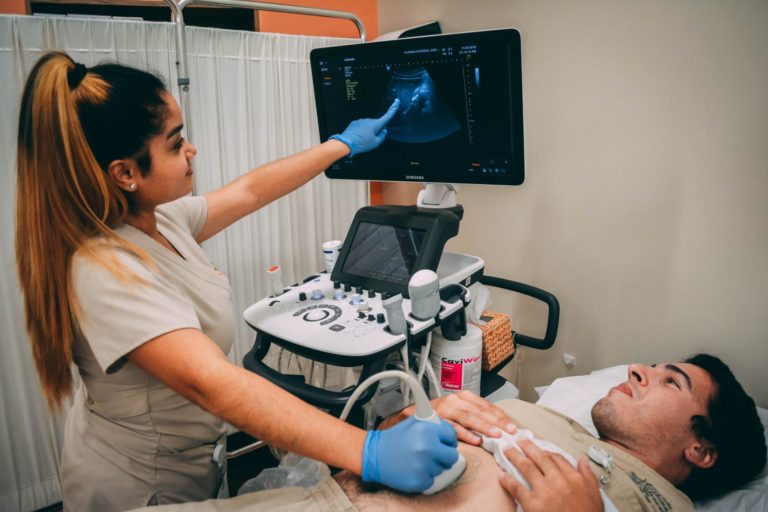
Education Requirements
Associate's Degree
Average Salary
$61k
Sonographers operate medical ultrasound imaging equipment that uses soundwaves to create images of internal organs and tissues. They prepare patients for procedures and analyze the resulting images, flagging abnormal results for the physicians responsible for diagnosis and treatment. Sonographers may focus on specific areas, such as the heart and blood vessels, or specialize in prenatal imaging.
Skills Needed
Sonographers typically earn an associate or bachelor’s degree and complete a certificate program in diagnostic medical sonography. Sonographers should have good interpersonal skills, be comfortable with close patient contact, and have the stamina for what can be long hours on their feet and the physical strength to help move patients when necessary for more accurate imaging.

Education Requirements
Post Secondary Nondegree Award
Average Salary
$37k
EMTs (emergency medical technicians) and paramedics perform similar roles in responding to emergencies, performing stabilization procedures and lifesaving treatment in the field and transporting patients to hospitals. Only paramedics are allowed to insert IVs and administer medications along with other more advanced procedures.
Skills Needed
Becoming an EMT is often a first step in becoming a paramedic, although EMT alone is also a viable career options. EMTs must have a high school diploma or GED followed by a training program, which can sometimes be completed in less than a year, plus certification and licensing. Paramedics usually complete another year or so of training that includes work experience as an EMT, followed by certification and licensure requirements. Paramedics and EMTs should have the physical strength and stamina to manage strenuous situations that may involve critically injured or ill patients or hazardous circumstances. They should also be compassionate and be able to retain composure in emergencies.
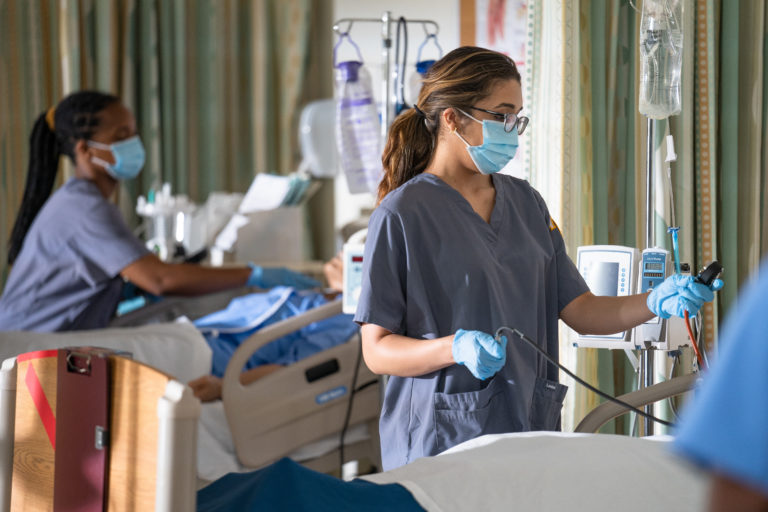
Education Requirements
High School Diploma and Training Program
Average Salary
$35k
Emergency room technicians are EMTs who work in hospital emergency rooms, usually under the supervision of nurses. Emergency room technicians have a wide variety of responsibilities that may change quickly in response to individual patient needs, from preparing equipment and supplies to assisting with direct patient care. Some emergency room technicians have additional training and certifications for procedures like catheterization.
Photo courtesy of Metropolitan Community College
Skills Needed
Emergency room technicians have EMT certification and licensing through a training program that usually takes less than two years. Employers generally require emergency room technician candidates to have EMT experience. Emergency room technicians should have compassionate for patients and families in what can be life-threatening situations and be able to work calmly under pressure with a highly skilled team.

Education Requirements
Associate's Degree
Average Salary
$50k
Medical equipment repairers, also called biomedical equipment technicians, set up and maintain and repair medical equipment and machinery. Some repairers specialize in one device category, others are familiar with a wide variety of equipment. Medical equipment repairers—especially those who have highly specialized training in repairing life-sustaining devices—may sometimes be called to work outside of regular work hours.
Skills Needed
Medical equipment repairers typically have a two-year associate degree, although a bachelor’s degree is sometimes required and ongoing education is needed to keep up with fast-moving improvements in technology. They should be able to work quickly and precisely in time-sensitive situations.

Education Requirements
Bachelor's Degree
Average Salary
$83k
Patient information coordinators are administrative professionals who maintain patient information from medical history to test results and clinical notes. They also manage flow of information to and from patients and caregivers, medical staff, billing personnel, and insurance companies. They may also be involved in scheduling and follow-up activities.
Skills Needed
Some patient information coordinators have a two-year associate degree, but most have a bachelor’s degree. Patient information coordinators must have great communication and interpersonal skills and also be highly organized.

Education Requirements
Bachelor's Degree
Average Salary
$229k
Chief privacy officers ensure an organization’s compliance with HIPAA (Health Insurance Portability and Accountability Act) privacy regulations. They may implement staff training, lead the creation of policies and procedures to ensure patient privacy, and respond to violations claims.
Skills Needed
Chief privacy officers generally have a bachelor’s degree in the area of human resources, and most employers require related entry-level experience and a familiarity with HIPAA. Chief privacy officers should be able to present information clearly, be highly organized and attentive to detail, and maintain stringent confidentiality of sensitive personal information.

Education Requirements
Bachelor's Degree
Average Salary
$66k
Health data analysts review and organize tremendous amounts of data and communicate their findings to executive teams and medical personnel, and sometimes the public, through various channels and reporting methods.
Skills Needed
Health data analysts earn bachelor’s and master’s degrees, and some also earn a doctorate-level degree. Many employers require a healthcare information management credential, which involves passing a rigorous exam. Data analysts should be analytical thinkers and have strong attention to detail.
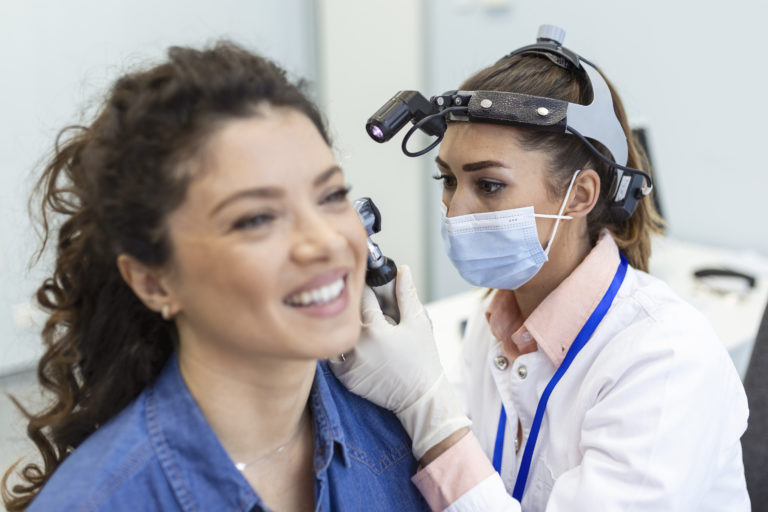
Education Requirements
Doctoral
Average Salary
$79k
Audiologists specialize in hearing, balance and other functions related to the outer, middle or inner ear. They test and diagnose patients and create treatment plans for conditions like tinnitus or vertigo and fit hearing impaired patients with hearing aids and assistive listening devices.
Skills Needed
Audiologists earn bachelor’s and master’s degrees followed by a doctorate degree, although the Au. D. is not classified as a medical degree. Audiologists should be collaborative, since they may work closely with other providers or educators, and resourceful. They should also have good people skills.

Education Requirements
Master's Degree
Average Salary
$79k
Speech and language pathologists (SLPs) work with patients of all ages on producing speech, developing language skills, improving social communication, and even addressing swallowing problems.
Skills Needed
SLPs must earn a bachelor’s degree and at least two years of graduate school in a master’s program for speech-language pathology, then meet requirements for industry certification and (if applicable) state licensing. SLPs should be flexible and resourceful, have good interpersonal skills, and exhibit persistence and patience for what can be a slow process with patients.

Education Requirements
Master's or Doctoral
Average Salary
$63k
Registered dietitians (RDs) have earned a credential set forth by the Commission on Dietetic Registration. These nutrition experts may work in medical facilities, governmental institutions, businesses, educational facilities and other organizations. They are able to diagnose eating disorders and design diets to treat specific medical conditions.
Skills Needed
RDs must hold a bachelor’s or master’s degree before passing a standard certification exam and obtaining a license. They should be compassionate, good communicators, flexible in managing highly individualized client needs, and able to work collaboratively with various teams.

Education Requirements
Bachelor or Master's Degree
Average Salary
$66k
Registered dietitian nutritionists (RDNs) have the expertise of credentialed dietitians with added emphasis on wellness and prevention and treatment of conditions. RDNs may develop programs for general nutrition schools, hospital food service departments, care facilities, athletic teams or facilities and others.
Skills Needed
RDNs, like registered dietitians, must hold a bachelor’s or master’s degree before passing a standard certification exam and obtaining a license. They should have good people skills, be responsive to clients’ unique needs, and able to work with other professionals in developing nutrition programs for individuals or groups of people.

Education Requirements
Bachelor's Degree
Average Salary
$56k
Licensed dietitians are state-regulated nutrition professionals. They generally design meal plans for patients with specific health concerns such as diabetes, kidney disease or obesity, and also provide nutrition counseling.

Education Requirements
Bachelor's Degree
Average Salary
$54k
Licensed dietitians are state-regulated nutrition professionals. They generally design meal plans for patients with specific health concerns such as diabetes, kidney disease or obesity, and also provide nutrition counseling.
Skills Needed
Licensed dietitians (LD) generally obtain the same basic education as registered dietitians, which includes earning a bachelor’s degree at minimum plus meeting certification and licensing standards. LDs often also have a master’s or even doctoral degree. They should be effective communicators with compassion for patients experiencing significant health issues, and also work well in collaborative situations.
Career salary data provided by: U.S. Bureau of Labor Statistics Occupational Outlook handbook and O*NET OnLine.